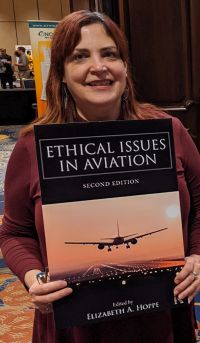
|
| presents
|

|
|

|
The 1998 Swissair crash
led critics to accuse the Federal Aviation
Administration (FAA) of a tombstone
mentality, meaning that the agency only
mandates changes to regulations after a
fatality has occurred. But why would
an agency dedicated to safety develop such a
mentality? One of the key problems concerns
the Cost-Benefit Analysis approach to
decision making. The agency decided that the
costs to make the necessary repairs would be
too great of a burden for the airlines and
only required the changes after 229 people
lost their lives. While the tombstone
mentality critique has fallen out of use, it
appears that this mentality is alive and
well in today's aviation industry. From the
certification process of the Boeing 737 MAX
to the spread of Covid-19, the industry
tends to address problems much too late.
Using anticipatory technology ethics, I will
attempt to show how ethical theory can play
a role in overcoming the tombstone
mentality. If Boeing had utilized
anticipatory technology ethics in the design
phase of the 737 MAX, the designers could
have foreseen the need for enhanced pilot
training on the new technologies. Concerning
Covid-19, people were already aware of the
potential for disease spread from air
travel, and an anticipatory ethics approach
to decision making could have helped
mitigate the spread of Covid-19. Of course,
anticipatory ethics is not without faults,
but including it within the decision-making
process could help prevent some of the
problems impacting the aviation industry
today.
|
|
FREE and
ONLINE
Tuesday, June 23, 2020
5:30-7:00 pm CDT
|
|
Sign in 5:00-5:30 pm for
informal cigar and cocktail chatter.
The event will be
called to order at 5:30.
There will be a Q&A session
following the lecture. Audience
participation is invited.
The event will conclude at 7 pm.
An (optional) discussion and cocktail
party will continue after the event.
Be sure to have your
cocktails and cigars at ready
hand.

|

|
Elizabeth
Hoppe is Lecturer in
Philosophy at Loyola University,
where she has been teaching ethics
and related topics for the past six
years, and the editor of Ethical
Issues in Aviation (2d ed.
2018). Her research interests
include ethics, applied ethics, and
critical race theory.
Dr. Hoppe writes,
In 2000 I graduated from DePaul
University with a PhD in
Philosophy. At the time I
was interested in ancient Greek
philosophy, especially Plato's
metaphysics and his concepts of
time and eternity.
As I began teaching at Lewis
University (1999-2014), in the
southwest suburbs of Chicago, I
developed an interest in the field
of Ethics and Applied Ethics.
Because Lewis has a large aviation
program, in 2003 I designed a
course on Aviation Ethics because
I thought it was important for the
students of aviation to not only
learn about Ethics broadly
speaking, but also the ways in
which ethical theories can apply
to dilemmas that arise in the
aviation industry. This resulted
in my textbook, Ethical Issues in
Aviation. |
|
|
|
About
the
Cigar Society of Chicago
ONE OF THE OLDEST AND
greatest traditions of the city clubs of
Chicago is the discussion of intellectual,
social, legal, artistic, historical,
scientific, musical, theatrical, and
philosophical issues in the company of
educated, bright, and appropriately
provocative individuals, all under the
beneficent influence of substantial
amounts of tobacco and spirits. The
Cigar Society of Chicago
embraces this tradition and extends it
with its Informal Smokers, University
Series lectures, and Cigar
Society Dinners, in which cigars,
and from time to time pipes and
cigarettes, appear as an important
component of our version of the classical
symposium. To be included in the
Cigar Society's mailing list, write to the
secretary at
curtis.tuckey@logicophilosophicus.org
|
|
|